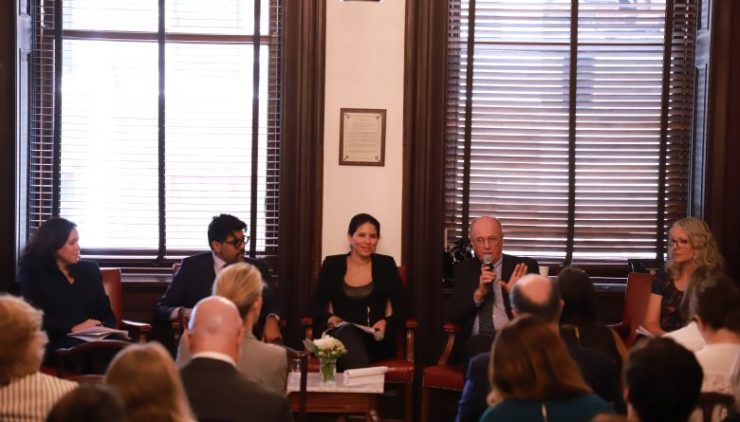Vance Center Hosts Panel on Business and Human Rights Arbitration
September 2019
(From left: Marney Cheek , Yousuf Aftab, Meriam Al-Rashid, Robert C. Thompson, Jenny Holdcroft | Photo credit; Eli Cohen)
The Vance Center’s Human Rights and Access to Justice Program held a panel on the effectiveness of arbitration to resolve business and human rights disputes, at the New York City Bar Association, whose Arbitration, International Law and International Human Rights Committees co-sponsored the event. Arbitration is a relatively novel method of addressing the practical difficulty of implementing human rights standards in the commercial context and providing greater predictability and accountability to international investment activities.
The event brought together leading arbitrators and BHR specialists to consider the pros and cons of arbitration as a dispute resolution mechanism under the United Nations Guiding Principles on Business and Human Rights. They also discussed the implications, lessons, and best practices learned from the Accord on Fire and Building Safety in Bangladesh (“Bangladesh Accord”), the first BHR dispute taken to an international arbitral tribunal.
Panelists included Yousuf Aftab, founder and principal of Enodo Rights, Robert C. Thompson, member of the Working Group on Business and Human Rights Arbitration Rules, Marney Cheek of Covington & Burling, and counsel to the Bangladesh Accord’s claimants, and Jenny Holdcroft, Assistant General Secretary of IndustriALL, one of the Accord’s claimants. Meriam Al-Rashid, Dentons partner and Vance Center Committee member, moderated the panel.
Debevoise & Plimpton International Dispute Resolution and Public International Law Groups Co-Chair Donald Francis Donovan, who acted as the presiding arbitrator in the Bangladesh Accord arbitration, delivered opening remarks. He analyzed how consent to arbitrate could occur in BHR disputes, building a typology of consent around three issues: (i) whether consent is given ex ante or ex post; (ii) whether consent is given simultaneously, or at two different points in time; and (iii) whether the parties to the underlying agreement will be the parties to the arbitration, or whether there are mechanisms for third parties to the agreement to become parties to the arbitration. His remarks also addressed waiver of other forms of recourse and mentioned “informed consent” and “fork-in-the-road” mechanisms. Donovan then discussed four options for norms to be applicable to BHR disputes: based on contractual terms-, domestic law, trade usages, or international human rights law.
Following Donovan’s remarks, the panelists first introduced the Guiding Principles as a legal basis for business responsibility to respect human rights. This is a nascent, but developing tool for holding businesses accountable in a defined, measurable way. Businesses must consider the human rights risks of their activities and demonstrate how they address these risks, including providing remedies for violations.
The panelists concurred that arbitration is a viable mechanism to remedy human rights violations arising from corporate conduct, based on the familiarity of arbitration and its generally-recognized benefits in resolving disputes.
On the other hand, the panelists underlined the challenges surrounding BHR arbitrations, including the inequality of resources between businesses and victims, the high costs of arbitration proceedings, and the difficulty of choice of law. The panelists also touched on the lack of mechanisms for enforcement of BHR arbitration awards.
A question-and-answer session raised the possibility and feasibility of pro bono representation of victims in BHR arbitration and the diverging interests of business and victims regarding confidentiality.

